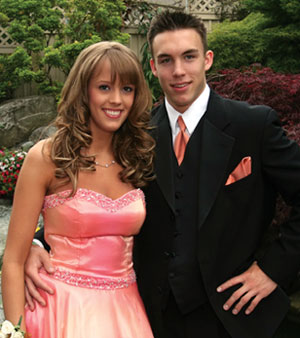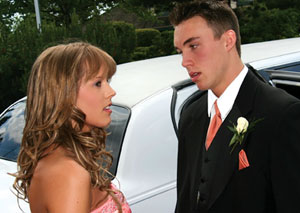Teen Dating Violence
Betsy Lawson writer

There are age-appropriate ways to talk with your child about teen dating violence, says Maura Renzella, youth director for the Wellesley Youth Commission. “But don’t wait until their first date to bring it up.”
Renzella describes teen dating violence as being on the extreme end of the bullying spectrum. With elementary students, bullying might be what happens at recess; for middle schoolers, it could be gossip spread via social media. But for older teens, bullying can also occur within a dating relationship, be it physical, sexual, or emotional abuse.
Much of the anti-bullying education now mandated in Massachusetts schools focuses on the role of the bystander, Renzella says. This same strategy of early intervention by a peer or trusted adult can help a teen stop the cycle of an abusive relationship before it escalates into violence.
Renzella is working with IMPACT Boston and REACH Beyond Domestic Violence to plan an awareness education forum in Wellesley on teen dating violence and how to talk about it with children. For the past few years, IMPACT Boston has offered its “Power Up” course in self-defense at Wellesley High School. One of its slogans is: “A fight avoided is a fight won.”
“It’s all about prevention, not reaction,” Renzella says. Establishing lines of communication early can empower kids to turn to a trusted adult. “Kids need to know it’s not ratting out a friend,” Renzella says, when they share their concerns for another’s safety.
Teens helping teens
When broaching the topic of dating violence with teens, Joanne Patterson likes to start with a scenario from daily life – like cell phone use. “How many texts from a boyfriend or girlfriend are too many?” Patterson may ask during an in-school workshop. “When does it become annoying?” she pushes, “even dangerous?”
Patterson is the director of education and prevention programs for REACH Beyond Domestic Violence, a Waltham-based nonprofit that serves families in 27 communities in greater Boston, including Wellesley and Weston. She’ll ask teens to share their values and opinions about what makes for “a healthy and safe relationship.”
There may be a girl in one of Patterson’s groups, for example, whose boyfriend texts her constantly to ask where she is and who she is with. It’s her first dating relationship, and she likes the attention, even though he gets angry when she doesn’t immediately text back.
Hearing peers say that too many texts would be annoying–even a reason to break up–may not have occurred to her. She might confide to a friend or trusted adult about what’s been happening in her relationship. If that peer or adult is aware of the warning signs of abusive relationships (see Warning Signs, page 146), intervention can happen earlier rather than later.
Another good starting point is the first date. Patterson will have teens visualize their date showing up 30 minutes late, being sloppily dressed, making you pay for everything, and being on the phone the whole time.

Going on a second date with such a person always gets a resounding “no” from the group. But in reality, Patterson says, most relationships start on a high note–the “hearts and flowers” stage–with both partners enchanted with each other. In the cycle of dating violence, however, the abuser’s treatment deteriorates over time. These changes can be so subtle that the partner may not even be aware that personal boundaries have been violated.
“Because dating relationships can be among the most private for teens, outward signs may be hard to detect – but they’re there,” Patterson says. Some examples:
• For a teacher, it may be a good student whose grades are slipping, and she’s now coming in late to class. You see her boyfriend talking to her in the hall everyday even after the bell has rung.
• For a coach, it may be a player whose girlfriend shows up at every practice and demands he leave with her even when the rest of the team is celebrating as a group.
• For a parent, it may be a neighbor who points out that your two girls, friends for years, never seem to hang out anymore.
Taken individually, these scenes might look like typical teen behavior, notes REACH Executive Director Laura Van Zandt, a Wellesley resident. But they can also be warning signs that a relationship may take a darker turn. Indeed, a Liz Claiborne study in 2005 found that one in ten teens has experienced physical and/or sexual violence in a relationship; one in three knows someone in an abusive relationship.
REACH has a section for teens on its Web site called PAVEnet (Peers Against Violence) as well as one for adults. The site offers advice that stresses the importance of focusing on behaviors, rather than criticizing the dating partner or friend. Instead of lecturing, a parent or friend should try to help teens talk through their feelings about whether or not to stay in an abusive relationship and how to stay safe should they choose to break up.
Lindsay Schwartz is an outreach worker with Human Relations Service (HRS), a private, nonprofit mental health agency that offers a full range of outpatient diagnosis, treatment, and crisis intervention services for families in Wellesley, Weston, and Wayland. For the past five years, Schwartz has been stationed at Weston High School.
“One of the toughest things about dating violence is that often the victim doesn’t feel victimized,” Schwartz says. Rather, the victim often comes to the defense of the abuser or believes he or she must have done something wrong for which the poor treatment is justified. Even when the abused partner does recognize that the relationship is no longer comfortable or rewarding, the thought of ending it can feel overwhelming –even socially devastating – for a teen.
“If the couple runs in the same social circle, high school is a tough place to avoid each other after a break-up,” Schwartz says. Knowing they’ll have the support of friends and family can be the reassurance they need to break free from an unhealthy relationship–and to stay safe.
For information about upcoming Youth Commission events and programs on this topic and more, visit the “Boards and Committees” section of the town Web site at www.ci.wellesley.mass.us/ ![]()
Warning Signs:
Is someone you care about in an abusive relationship?
© 2011 Elm Bank Media | Beth Furman, Publisher | Beth@ElmBankMedia.com


recent comments